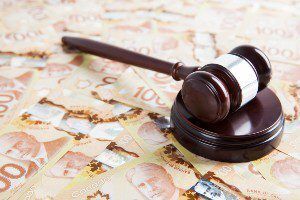 Most car accident cases are based on the legal theory of negligence. One party failed to exercise the degree of care that a reasonable person would have done and this failure caused harm to another.
Most car accident cases are based on the legal theory of negligence. One party failed to exercise the degree of care that a reasonable person would have done and this failure caused harm to another.
However, there are other times when an at-fault party’s negligence is particularly egregious and outside the scope of reasonable behavior. Drunk driving accidents are examples of cases that involve gross negligence with little to no regard for the safety and well-being of others. In these cases, punitive damages could be argued – but it is important to understand that these damages are rarely awarded.
Our lawyers discuss the purpose of punitive damages and how they are different from compensatory damages. Learn how we may be able to help you and get answers to your questions by arranging a free consultation. This initial meeting comes with no obligation. There are zero upfront fees to hire our firm.
Proven Results. Millions Recovered.
(866) 320-4770
The Purpose of Punitive Damages
Punitive damages, also known as exemplary damages, are over and beyond what is intended to make an accident victim whole again. These damages are not compensatory, meaning they are not awarded to compensate accident victims for the injuries they have suffered and the damages they have sustained.
The purpose of punitive damages is to punish at-fault parties for their grossly negligent or intentional behavior. These damages are meant to discourage others from engaging in similar conduct in the future.
Punitive damages serve a valid and useful purpose but are relatively rare. Canadian courts are generally careful in exercising their discretion to award punitive damages. These damages are only awarded in exceptional cases for malicious, oppressive and high-handed misconduct.
Punitive damages that may be awarded in certain types of car accident cases include:
- Drunk driving accidents
- Stunt driving and street racing crashes
- Hit-and-run accidents
- Speeding or reckless driving collisions
These damages may also be awarded in cases where someone intentionally causes a crash that results in serious, life-altering injuries. For instance, vehicle owners who knowingly drive their vehicles with badly malfunctioning brakes or drive with a suspended license and have a long history of driving violations.
Punitive Damages in Ontario Accident Cases
The majority of car accident cases do not award punitive damages. There must be clear and convincing evidence that the at-fault party willfully and recklessly caused injury or death to another driver, passenger, pedestrian or bicyclist.
Punitive damages in Ontario are reserved for behaviors that are so malicious and outrageous that they are deserving of punishment on their own. This can be difficult to establish since most accidents are not due to acts of gross negligence. The bar is also higher in proving punitive damages than for other types of damages.
If you have been injured in a car accident and believe that the at-fault party was particularly reckless, we recommend reaching out to a qualified Windsor vehicle accident lawyer at our firm. We are prepared to review your particular circumstances and evaluate the damages that you may be available to pursue.
How Much Are Punitive Damages Worth?
The amount of punitive damages is left to the court’s discretion. These damages could be awarded in addition to compensatory damages, such as compensation to help cover medical bills, lost wages, and pain and suffering. The amount awarded could be higher or as much as compensatory damages.
However, it is important to note that despite overwhelming evidence that an at-fault party acted deliberately or had a willful motive to injure, punitive damages may still be denied by a judge or jury. Even if punitive damages happen to be awarded, they may be lowered on appeal.
In one landmark car accident case, a jury awarded $100,000 in punitive damages to punish an impaired driver who struck a pedestrian. The driver’s blood-alcohol level at the time of the crash was two to three times over the legal limit. However, the Ontario Court of Appeal reduced it to $20,000 citing that the damages did not serve a rational purpose and were not proportionate to the at-fault party’s misconduct.
Reach Out for Experienced Legal Help
At Greg Monforton & Partners, we have helped many injured accident victims over the past four decades obtain the maximum compensation possible for their damages. We are ready to hold an at-fault party or parties responsible for their actions, particularly in cases due to egregious negligence.
Call our firm today to set up a consultation. There is no cost to talk to a lawyer about your potential case and no obligation to take legal action. If you do have a valid case and decide to move forward, we charge nothing up front for our services and no fees while we work on your case.
Experienced. Local. Lawyers. Ph:
(866) 320-4770